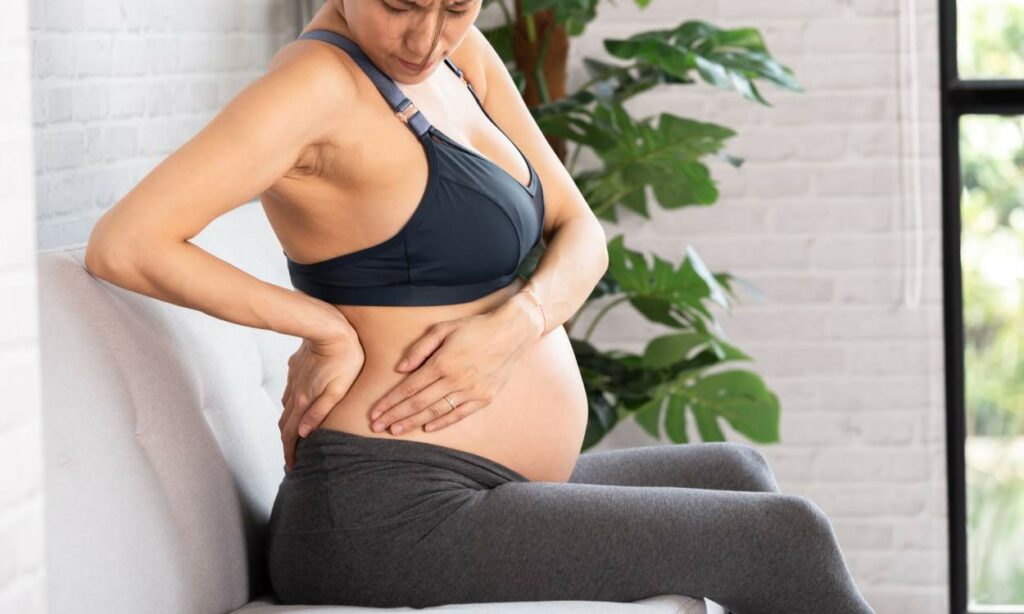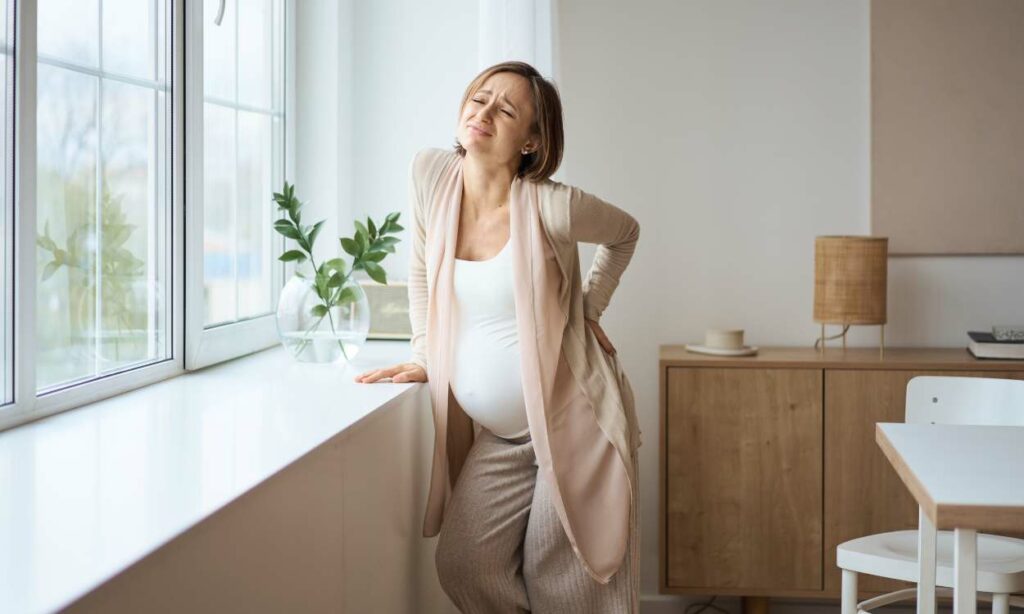Navigating the joys of pregnancy can often come with its set of unexpected challenges. The glow of impending motherhood might sometimes be interrupted by those sneaky aches and pains that no one warned you about. If you’ve found yourself rubbing your hips more often, seeking a comfortable position in bed, or wincing with every step, you’re not alone. Hip pain during pregnancy is a common, albeit frustrating, companion for many expectant mothers. But why does it happen? And more importantly, how can you find relief without compromising your baby’s safety? Let’s delve into the world of hip pain during pregnancy, understand its causes, and explore solutions to help you stride confidently through each trimester.
Contents
The Pregnant Body: A Rapidly Changing Landscape
 Pregnancy is a miraculous journey, transforming a woman’s body into a nurturing environment for a growing life. But with this transformation comes a cascade of physical changes that can often be a lot to bear, especially on the hips.
Pregnancy is a miraculous journey, transforming a woman’s body into a nurturing environment for a growing life. But with this transformation comes a cascade of physical changes that can often be a lot to bear, especially on the hips.
Hormonal Shifts: From the get-go, hormones like relaxin begin to surge, preparing your body for childbirth. Relaxin loosens the ligaments around the pelvis, allowing it to expand and accommodate the growing baby. While beneficial for childbirth, this hormonal effect can sometimes result in increased hip mobility and discomfort.
Weight Gain: As the baby grows, so does the weight a mother carries. This added weight puts extra pressure on the hips and pelvis, leading to increased strain on the joints and surrounding muscles.
Altered Center of Gravity: With a growing belly, a woman’s center of gravity shifts forward. This subtle change prompts an altered posture, where the lower back might arch more, and the hips tilt, often leading to discomfort in the hip region.
Expansion of the Pelvis: To pave the way for delivery, the pelvis starts to widen. As it does, the hip joints may experience added stress and discomfort.
Fetal Position: Depending on how your little one chooses to nestle in, their position can sometimes press on certain nerves or parts of the hip, causing pain or discomfort.
Understanding these physical changes provides a crucial context for why hip pain can emerge during pregnancy. Recognizing the origins of the pain is the first step in seeking effective relief and comfort.
Why Hips Hurt: Anatomy of Pregnancy-Related Discomfort

As the body readies itself to welcome a new life, it undergoes intricate anatomical and physiological adaptations, especially in the pelvic region. These changes, while essential for the safety and comfort of the growing fetus, can sometimes cause discomfort for the expectant mother. Let’s delve into the specifics.
Ligament Laxity
As mentioned earlier, the hormone relaxin is released in greater quantities during pregnancy. Its primary role is to loosen the ligaments around the pelvis. While this flexibility is vital for childbirth, the increased laxity can make the hip joints less stable, potentially leading to pain.
Symphysis Pubis Dysfunction (SPD)
The front of the pelvis consists of the symphysis pubis, a firm, flexible joint. With the impact of relaxin and the natural widening of the pelvis, this joint can sometimes become overly elastic. As a result, the joint can move more than usual, causing pain in the front of the pelvis that often radiates to the hips.
Increased Load
The hips play a pivotal role in bearing the body’s weight. With the added weight of the fetus, placenta, increased blood volume, and amniotic fluid, the hips bear an even more significant load. This increased demand can strain the hip muscles and lead to discomfort.
Sciatic Nerve Pressure
The largest nerve in the body, the sciatic nerve, runs from the lower back through the hip and down the leg. As the uterus expands, it can press against this nerve, causing sharp, shooting pains in the buttock and hip area.
Hip Flexor Strain
The growing belly can cause an exaggerated curvature of the spine (lordosis). This alteration in posture can lead to a shortening and tightening of the hip flexors, the muscles that run from the upper thighs to the lower back. When these muscles are strained, they can cause pain in the hip region.
Edema and Fluid Retention
Many pregnant women experience swelling due to fluid retention, especially in the later stages. This swelling can affect the hip joint, leading to stiffness and pain.
In essence, the magic of creating life is accompanied by significant anatomical adjustments. These changes, though wondrous, can exert strains and pressures on the pelvic and hip region. By understanding the roots of the discomfort, expectant mothers can better navigate the journey towards a more comfortable pregnancy.
Common Causes of Hip Pain in Expectant Mothers
 Pregnancy is a time of profound bodily changes, and while it’s a beautiful phase, it can also introduce various discomforts. Here are the specific conditions that commonly result in hip pain for pregnant women:
Pregnancy is a time of profound bodily changes, and while it’s a beautiful phase, it can also introduce various discomforts. Here are the specific conditions that commonly result in hip pain for pregnant women:
- Symphysis Pubis Dysfunction (SPD):
- An often painful condition where the ligaments that keep the pelvic bone aligned become too relaxed and stretchy. This over-flexibility can lead to instability in the pelvic joint known as the symphysis pubis.
- Causes sharp pain in the pubic area, which can radiate to the thighs and hips.
- Sciatica During Pregnancy:
- Refers to pain, weakness, or tingling in the leg, caused by injury or pressure on the sciatic nerve.
- As the fetus grows, the expanding uterus can press against this nerve, leading to sharp, shooting pain from the lower back, through the hip, and down the leg.
- Effects of the Hormone Relaxin:
- Relaxin is a hormone that increases significantly during pregnancy.
- Its primary role is to relax uterine muscles, preventing contractions in early pregnancy. It also plays a vital role in preparing the cervix and pelvis for childbirth.
- However, it can cause ligaments in the pelvis to become overly loose, leading to pain due to decreased stability in the hips.
Understanding these specific causes can provide clarity to expectant mothers and assist in seeking appropriate interventions or remedies to alleviate discomfort.
Safe Pain Relief: What Can You Do?
 Pregnancy is a delicate phase, and many conventional pain relief methods might not be safe for expectant mothers. However, numerous non-pharmacological remedies can be highly effective in easing hip discomfort during this period:
Pregnancy is a delicate phase, and many conventional pain relief methods might not be safe for expectant mothers. However, numerous non-pharmacological remedies can be highly effective in easing hip discomfort during this period:
- Gentle Exercises:
- Prenatal Yoga: Offers stretching, mental centering, and focused breathing which can alleviate pain and prepare the body for childbirth.
- Pilates: Strengthens the core, improving posture and potentially reducing hip pain.
- Swimming: Provides a full-body workout and alleviates pressure from the joints, making it an ideal exercise during pregnancy.
- Targeted Stretches:
- Butterfly Stretch: Sitting down, bring your feet’s soles together. Holding your feet, gently push your knees down with your elbows. This helps stretch and open the pelvis.
- Piriformis Stretch: While lying on your back, bend both knees and cross one ankle over the opposite knee. Gently pull the uncrossed leg towards your chest for a deep hip stretch.
- Use of Pregnancy Pillows:
- Full-body Pillows: Support the whole body, ensuring that the spine remains aligned, reducing pressure on the hips.
- Wedge Pillows: Placed under the belly or back for added support during sleep.
- Knee Pillows: Positioned between the knees to ensure hip alignment during sleep.
- Warm Baths: Warm water can relax the muscles and provide relief from hip pain. Always ensure the water temperature is not too hot and is comfortable for you.
- Prenatal Massages: Seek a trained therapist familiar with pregnancy massages. This can soothe sore muscles and offer relaxation.
- Wearing a Pregnancy Support Belt: It can provide additional support to the hips and lower back, especially during the later stages of pregnancy.
It’s always essential for expectant mothers to consult with their healthcare provider before starting any new exercises or interventions.
When To Seek Help
While it’s not uncommon for expectant mothers to experience varying degrees of discomfort, hip pain during pregnancy shouldn’t be dismissed, especially if it intensifies or persists. Understanding when it’s time to escalate your concerns can be crucial for your well-being and that of your baby.
Recognizing the Need for Professional Assistance:
- Persistent Pain: If the pain remains unrelieved despite home remedies or is increasingly bothersome, it might be time to reach out.
- Impaired Mobility: If you find it challenging to perform daily activities or the pain is restricting your movements significantly.
- Associated Symptoms: Presence of other symptoms like numbness, tingling, or radiating pain towards the thighs or lower back.
- Severe Sharp Pain: Sudden, sharp pain that doesn’t go away might indicate a more serious underlying issue.
Treatment Options To Manage Hip Pain During Pregnancy

- Physiotherapy: A trained physiotherapist can provide exercises tailored to pregnant women to alleviate pain and strengthen the pelvic and hip muscles. They can also offer advice on posture and movement to reduce strain on the hips.
- Consultation with an Obstetrician: Always discuss any pains or discomforts with your obstetrician. They can offer medical insights, recommend treatments, or even refer you to a specialist if needed.
- Prenatal Chiropractic Care: Some women find relief with chiropractic adjustments tailored for pregnancy. These adjustments can help realign the pelvis, potentially easing discomfort.
- Acupuncture: Some expectant mothers benefit from acupuncture, which can provide pain relief and relaxation. Always ensure the practitioner is experienced in treating pregnant women.
- Wearing Supportive Footwear: Proper footwear can offer the necessary arch and ankle support, reducing strain on the hips and back.
- OTC Medications: While many medications are off-limits during pregnancy, some might be safe in moderation. Always consult with your healthcare provider before taking any over-the-counter pain relievers.
While pregnancy is a beautiful journey, it’s essential to remember that you don’t have to endure severe discomfort. Seeking help and understanding the available treatments can make your experience smoother and more enjoyable.
Conclusion
Navigating the joys and challenges of pregnancy can sometimes be overshadowed by physical discomforts like hip pain. Remember, you don’t have to endure it in silence. With the right knowledge and interventions, relief is within reach. If you’re experiencing Hip pain, physical therapy for hip pain at PhysioMantra can help: Book an online physical therapy session.



